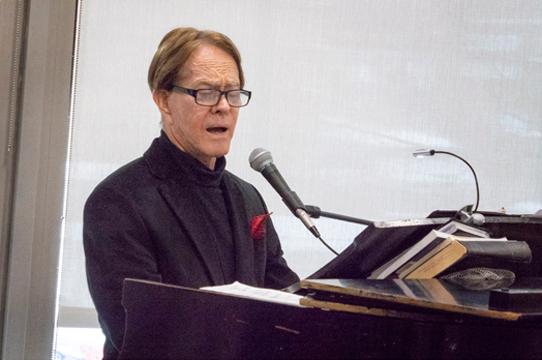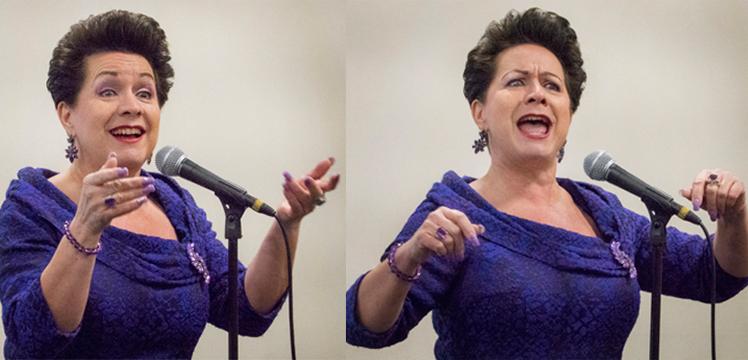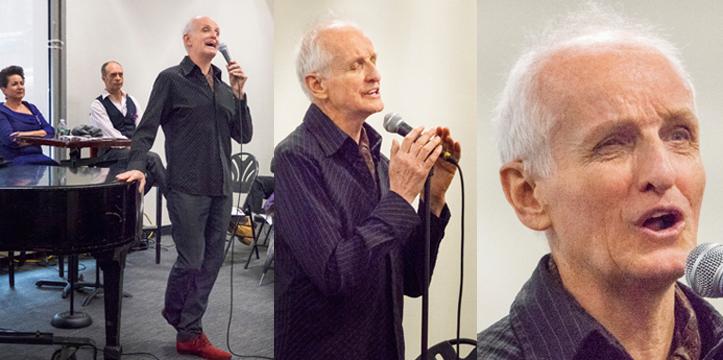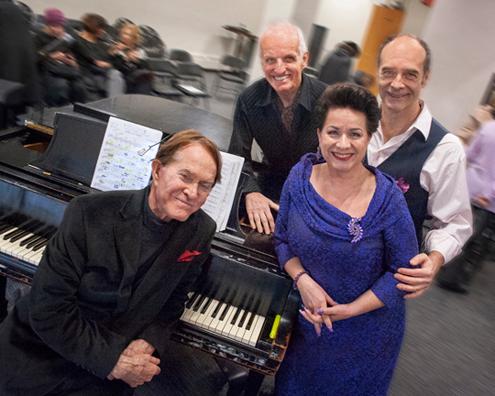by Alix Cohen
Steve Ross is a self-admitted, dyed in the wool Francophile. Hosting the first of what one can only hope will be a series at the 92Y, he shares that admiration and his talent in equal measure. All four of today’s vocalists, two Americans, one Dutch, and one French, sing in both English and French. All have made performance of the language and its writers part of veteran careers.
Ross himself starts in French with two by Charles Trenet, “Que Reste-t’il?” (Leo Chauliac-music) and “La Mer.” The first translates as “What Remains of Our Loves?” …A memory that pursues me without fail/a shadow of happiness, windblown hair/stolen kisses, moving dreams…It’s as if our host is plumbing his memory in real time. The second conjures someone looking out at sea (la mer) aching for a lover’s absent arms. Tenor lines create frisson.
“There aren’t that many songs that have lasted 200 years, Ross begins introducing 1784’s “Plaisir d’amour” (Jean-Paul-Égide Martini from a poem by Jean-Pierre Claris de Florian.) “This has been sung by everybody, even ending up with that great French interpreter, Elvis Presley.” … The pleasure of love lasts only a moment,/The grief of love lasts a lifetime… Ross and Jean Brassard sing with subtly shimmering emotion.
“The first important French singer I saw was a little woman with frizzy hair on The Ed Sullivan Show. I’m so happy not to have to explain who he (Sullivan) was.” La petite femme? Edith Piaf. Ross quotes a Flying Walenda expressing sentiment that parallels Piaf’s feelings about love. “My life is on the high wire, all the rest is waiting.”
Sue Mathys gives us three by The Little Sparrow. “La Vie en Rose” (Edith Piaf/Louigy) is filled with ardor. Arms seem to move only when compelled. Mathys reaches out and grabs at elusive love…deep breath…hand on heart…mon coeur.
Piaf almost missed a song written for her at the very end of her career by refusing to see its author time and time again. “Je Ne Regrette Rien” (Michel Vaucaire/Charles Dumont) became a signature number. Mathys seems proud, defiant.
In “Milord” (George Moustaki/Marguerite Monnot), the vocalist portrays a fille de joie (prostitute) trying to cheer up a potential client. The tune toggles between concern and buoyant, suggestive encouragement. Mathys’ nostrils flare as she throws her head back shaking a mane of (non- existent) long hair. A wonderful denouement: But… you’re crying, Milord/That…I would never have believed it…precedes one last effort to please. The performer is invested.
Jean Brassard’s “A Paris” (Francis Lemarque) was a song popularized by Piaf’s first lover, Yves Montand, a last minute substitute for her opening act. “She called him the phony cowboy, he called her the wet blanket and they fell in love.” The number is full of affection and personality; accompaniment flush and dancy. (If you’ve never seen Brassard’s charming Montand show, make it a point whenever it again appears.)
“C’est si bon” (Henri Betti/Andre Hornez-English lyrics –Jerry Seelen), another Montand hit, finds Brassard playing flaneur, strolling before us, bubbling with pleasure and good will. Elle fait, oh!, he puts his hand on his chest; elle fait, ah!, it’s raised to his head. Deelightful.
From the film ‘The Gates of Night,’ Brassard sings “Les Feuilles Mortes (Jacques Prevert/ Joseph Kosma)- what we know as “Autumn Leaves,” with a new translation of the introduction by David Kruger. A melancholy remembrance of beauty, it does, in fact, drift down with wistful grace.
Frans Bloem offers a Charles Aznavour tribute. Having been the bohemian he describes in “La Boheme” (music- Jacques Plante), the artist’s expression is palpably heartfelt. He seems to be trying to conjure the place and time by an act of will. Towards the end, one knee bends back as his hand sweeps across history. Perhaps Aznavour’s most famous song, “She” (with Herbert Kretzmer) arrives with passion and pain. We imagine Bloem imagining someone.
“Comme Ils Disent” is prefaced by the admission that for a very long time Bloem didn’t want to perform the number: …my real job is at night./that I practice cross dressed:/I’m an artist/I have very special number/that ends completely naked…What makes a man a man?… Today, he delivers the evocative outsider history, including unrequited love, from heart and gut.
Ross came to New York in 1968 when Jacques Brel is Alive and Well and Living in Paris was running Off Broadway. The musical introduced him to chanson réaliste. “I didn’t know that things like grit and politics could appear in popular songs.” Our host performs “La Fanette” (Eric Blau/ Jacques Brel) as if every lyrical thought is wrenching to share:
…I’ve never learned…Ross sings as an arm goes up to smooth his hair in patent distress; “but let’s talk of something else,” he says dismissively…And at night sometimes/When the waves stop/I hear like a voice/I hear… It’s Fanette…Sounds of a fading music box. Simply heartbreaking.
The company joins in a robust “If We Only Have Love” (Mort Shuman/Eric Blau/Jacques Brel) and we reluctantly file out. A concert for gourmets.
Photos by Steve Friedman
Songs with Steve Ross: If We Only Have Love-French Songs from Piaf to Brel
Guests: Frans Bloem, Jean Brassard, Sue Mathys
92Y at Lexington Avenue
February 12, 2019 https://www.92y.org/
Attention Francophiles: National Sawdust presents Voyage en Chanson
Karen Akers, Jean Brassard, Kathleen Landis, Steve Ross- Directed by Jean Brassard
March 24, 2019
80 North Street, Brooklyn























